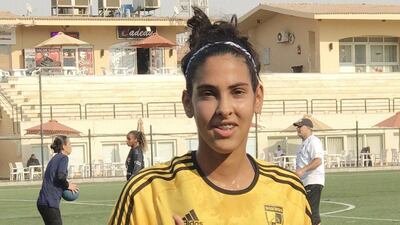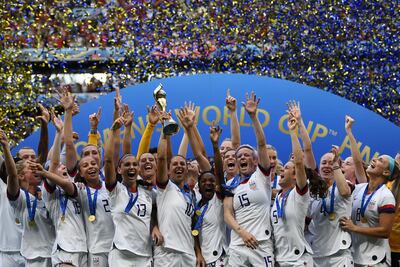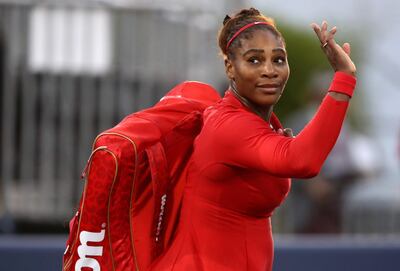In an Instagram live chat on Saturday, Serena Williams listened intently as movie star Natalie Portman was citing statistics about the shocking disparity between the coverage of men’s and women’s sport in the US.
“It’s insane that we’re here in 2020 and it’s so disproportionate the coverage and the attention that male sports still get compared to the women’s sports,” the Academy award-winning actress told the 23-time Grand Slam tennis champion.
“Only four per cent of sports coverage is of women’s sports, which is insane. I mean the WNBA is playing today, we’ve got the final of this amazing soccer tournament tomorrow; of course tennis, there’s also softball and volleyball and so many things that deserve more coverage.”
One might wonder: Why is Portman talking to Williams about women’s sport? The pair are part of a majority women-founded group that is bringing a women’s football team to Los Angeles in 2022, an announcement revealed last week.
The new franchise – dubbed Angel City for now – would participate in USA’s top flight, the National Women’s Soccer League.
Portman and technology venture capitalist Kara Nortman, and media and gaming entrepreneur Julie Uhrman are at the helm of the project, alongside Williams’ husband, Reddit co-founder Alexis Ohanian, who led the investment through his firm Initialised Capital.
Other Hollywood stars involved include Jennifer Garner, America Ferrera, Jessica Chastain, Uzo Aduba, and Eva Longoria, and they are joined by 14 former US National Team players, like Mia Hamm and Abby Wambach. Netflix vice president Cindy Holland is also a co-owner.
“I’ve been so inspired by the response to our announcement, and people are starting to think about how to do this in other sports too, which is just so exciting,” Portman told Williams.
A question that immediately popped to mind while listening to Portman was: How can we do this for women’s sport in the Arab world?
To have such massive names from the entertainment industry invest in women’s football is a huge boost, not just for the NWSL but for women’s sport in general. The NWSL has nine teams, with a 10th outfit, Racing Louisville, set to debut in 2021, a year ahead of Angel City.
Six of the 11 women’s sides are affiliated with men’s professional teams, but as of right now, Angel City are not tied in any way to their MLS counterparts LA Galaxy.
A year on from the 2019 Fifa Women’s World Cup, which had record-breaking TV viewership and is considered the strongest in competition history, it seems excitement over women’s football has not waned in various parts of the globe.
Earlier this month, Spanish giants Real Madrid formalised their acquisition of Madrid-based women's club CD Tacon for a reported €500,000 (Dh2.15m). Plans for the merger were announced last year, but things only became official on July 1, 2020, and for the first time in its 118-year history, Real Madrid have a women’s team.
Real Madrid Femenino will be competing in the Liga Iberdrola – Spain’s top division for women’s football – in the 2020/2021 season joining 17 other sides that include Real’s arch rivals Barcelona and Atletico de Madrid (2019/2020 campaign had just 16 teams).
One can only hope that the ripple effects of these significant recent developments in women’s football can somehow make their way over to the Middle East, where the sport is in desperate need of attention and investment.
Only eight Arab countries have a Fifa women’s football ranking, with Jordan leading the pack at 58 in the world.
The UAE stand at 97 on the charts, while Egypt, supposedly a massive footballing nation in the region, dropped off the rankings altogether in 2018, just two years after they appeared in their first women’s Afcon in 18 years and recorded their first victory in competition history.
Egypt has not had a women’s football national first team for the past few years and its women’s Premier League features just nine clubs, compared to 12 in the past.
The Egyptian FA are looking to resuscitate the women’s national side by focusing their efforts on the U20 squad, which they believe could graduate to become a full-strength first team.
In the UAE, women’s football started as recently as 2004 and received a welcome boost in 2009 with the formation of the Women’s Football Committee by the Football Association, dedicated to forming a women’s national team that would represent the country internationally.
They quickly tasted regional success by winning the West Asia Championship in 2010 and 2011. A year later, the WFC Women’s Football League came to life, mainly consisting of privately founded or women-specific clubs.
This coronavirus-interrupted season, the league – organised by the WFC in collaboration with the Ministry of Education, the FA and the Fatima bint Mubarak Ladies Sports Academy – has seven teams.
It includes Al Ain, the first time an AGL club has opted to field a women’s outfit in domestic competition. It is the first Al Ain women’s team in the club’s 52-year history.
Another significant milestone for the country came when Nouf Al Anzi became the first Emirati woman to play football professionally abroad, thanks to a stint with Egyptian Premier League serial champions Wadi Degla a couple of years ago.
Former UAE goalkeeper and WFC technical director Houriya Taheri, admits women’s football is still in its early stages in the country but believes huge strides have already been made, thanks to grassroots initiatives that have helped spread the sport among young girls.
An AFC-licensed national team coach and board member, Taheri hopes to see more AGL teams follow Al Ain’s suit in support for the women’s game.
"We hope that in the future there will be greater co-operation [with AGL clubs] and I think this will be improved by having it as part of professional clubs' licensing. It would be fantastic to add more teams and more support for women's football," Taheri told Sport Industry Insider last year.
Al Ain’s venture into women’s football is an important first step but a lot more needs to be done in order to elevate the league and garner the levels of investment and attention remotely close to those by Portman and Co.
It would be amazing if stars from the Arab world’s entertainment industry backed women’s sports and helped bring it under the spotlight.
It would be amazing if the biggest sports clubs in the nation chose to fund women’s squads, to create a stronger league – one that would be of value to broadcasters and can be aired on national television.
Portman had a twinkle in her eye when she told Williams the NWSL Challenge Cup is being shown on CBS.
I look forward to the day I switch on my TV and find a local women’s football match turn up on my screen.




